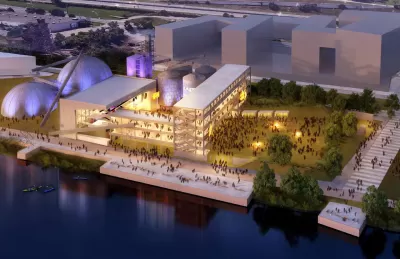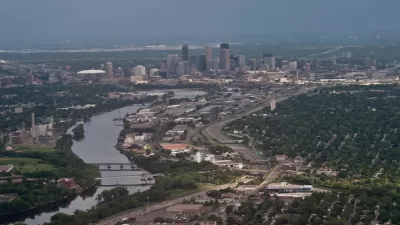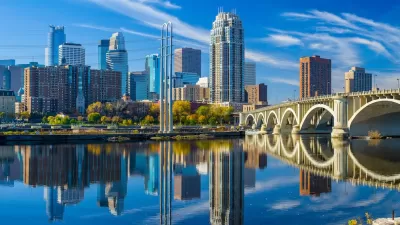The Minneapolis City Council will consider initial mixed-use development plans for critical riverfront industrial site surrounded by a struggling residential neighborhood.

"On Friday, the Minneapolis City Council will vote on a massive plan to turn 48 acres of riverfront land into housing, businesses and an outdoor performance venue," reports Jessica Lee. "The project — the Upper Harbor Terminal — is city officials’ No. 1 construction priority right now."
With the City Council's vote forthcoming, Lee digs into details of the project, which is considered "critical" to the city's economic development plans. The site housed a barge shipping terminal until fears of invasive carp forced the facility to close in 2014.
The project site is surrounded by a federal Promise Zone and a city Green Zone. The surrounding residential areas are defined by median household incomes below the city and regional average.
The City Council will consider the project's "General Land-Use Concept" on Friday, which lays the groundwork for more detailed design and planning work to follow.
Lee provides additional details about the funding challenges facing the project, as well as the tough political path the plan had to arrive at this point in its evolution.
FULL STORY: Everything you need to know, for now, about Minneapolis’ Upper Harbor Terminal project

Alabama: Trump Terminates Settlements for Black Communities Harmed By Raw Sewage
Trump deemed the landmark civil rights agreement “illegal DEI and environmental justice policy.”

Planetizen Federal Action Tracker
A weekly monitor of how Trump’s orders and actions are impacting planners and planning in America.

The 120 Year Old Tiny Home Villages That Sheltered San Francisco’s Earthquake Refugees
More than a century ago, San Francisco mobilized to house thousands of residents displaced by the 1906 earthquake. Could their strategy offer a model for the present?

LA’s Tree Emergency Goes Beyond Vandalism
After a vandal destroyed dozens of downtown LA trees, Mayor Karen Bass vowed to replace them. Days later, she slashed the city’s tree budget.

Sacramento Leads Nation With Bus-Mounted Bike Lane Enforcement Cameras
The city is the first to use its bus-mounted traffic enforcement system to cite drivers who park or drive in bike lanes.

Seattle Voters Approve Social Housing Referendum
Voters approved a corporate tax to fund the city’s housing authority despite an opposition campaign funded by Amazon and Microsoft.
Urban Design for Planners 1: Software Tools
This six-course series explores essential urban design concepts using open source software and equips planners with the tools they need to participate fully in the urban design process.
Planning for Universal Design
Learn the tools for implementing Universal Design in planning regulations.
Ada County Highway District
Clanton & Associates, Inc.
Jessamine County Fiscal Court
Institute for Housing and Urban Development Studies (IHS)
City of Grandview
Harvard GSD Executive Education
Toledo-Lucas County Plan Commissions
Salt Lake City
NYU Wagner Graduate School of Public Service




























